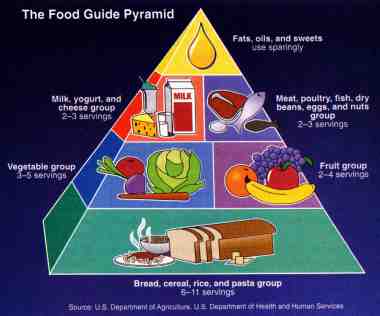|
Within rather broad limits, the nutrient requirements
of athletes and other individuals engaged in training programs can be achieved
with a balanced diet. With well planned menus, the vitamin, mineral, and protein
requirements can be met with an intake of about 1200 calories per day.
Additional food then can be consumed to meet energy needs depending on the daily
level of physical activity.
The recommended protein intake of 0.8g per kg body mass
is a liberal requirement believed to be adequate for all people, regardless of
physical activity level. Athletes generally consume 2-5 times the protein RDA
because their greater caloric intake usually provides proportionately more
protein.
Precise recommendations have not been established for
lipid and carbohydrate intake. A prudent recommendation is that no more than 30%
of the daily calories should be obtained through lipids. For people who are
physically active, 60% or more should come from carbohydrates. This generally
represents between 400-600g on a daily basis.
Successive days of hard training can gradually deplete
the body's carbohydrate reserves, even when maintaining the recommended
carbohydrate intake. This could lead to training "staleness" in which
continued training becomes exceedingly more difficult.

The eating-right pyramid provides broad recommendations
for healthy nutrition. Emphasis is placed on fruits, grains, and vegetables; de-emphasized
are foods high in animal protein, lipids, and dairy products. This approach to
nutrition is ideal for the physically active man and woman.
The most important factor determining the daily caloric
requirement is the level of physical activity. It is likely that the daily
caloric requirements of athletes in strenuous sports do not exceed 4000 calories
unless body mass is excessive or the training level or competition is extreme.
Such a high caloric intake usually exceeds the RDA requirements for protein,
vitamins and minerals.
The pre-competition meal should include foods that are readily
digested and contribute to the energy and fluid requirements of exercise. For
this reason the meal should be high in carbohydrates and relatively low in
lipids and proteins..
Three hours should be sufficient to permit digestion
and absorption of the pre-competition meal.
Commercially prepared liquid meals offer a practical
approach to pre-competition nutrition and caloric supplementation. These
"meals" are well balanced in nutritive value, contribute to fluid
needs, and are absorbed rapidly, leaving practically no residue in the digestive
tract.
Carbohydrate-containing re-hydration solutions consumed
during exercise can enhance high-intensity endurance performance by maintaining
blood sugar concentration. This can then be used by the active muscles to either
spare muscle glycogen or serve as reserve glucose for later use if muscle glycogen
becomes depleted.
For rapid carbohydrate replenishment after exercise,
individuals should consume carbohydrate containing foods - 50-70g each hour.
Concentrated sugar drinks slow the rate of gastric
emptying, which could ultimately upset the body's fluid balance. The ideal oral
re-hydration solution should probably contain between 5-8% carbohydrates. This
would permit carbohydrate replenishment without adversely affecting fluid
balance and thermoregulation.
|